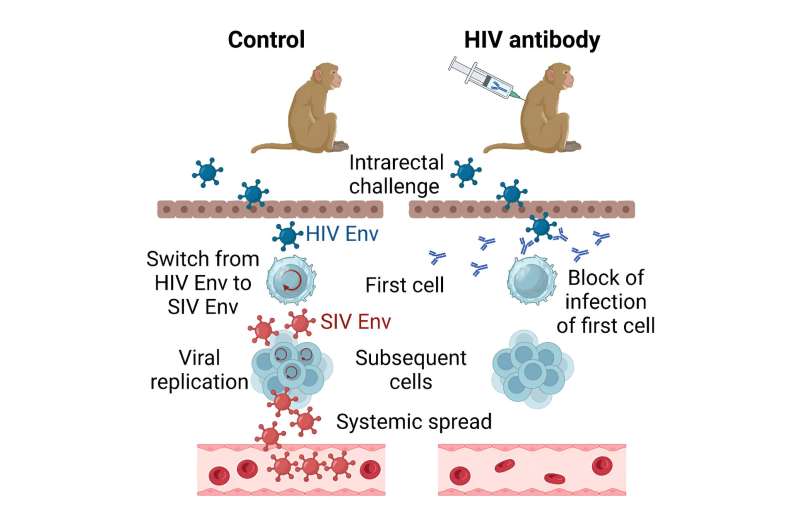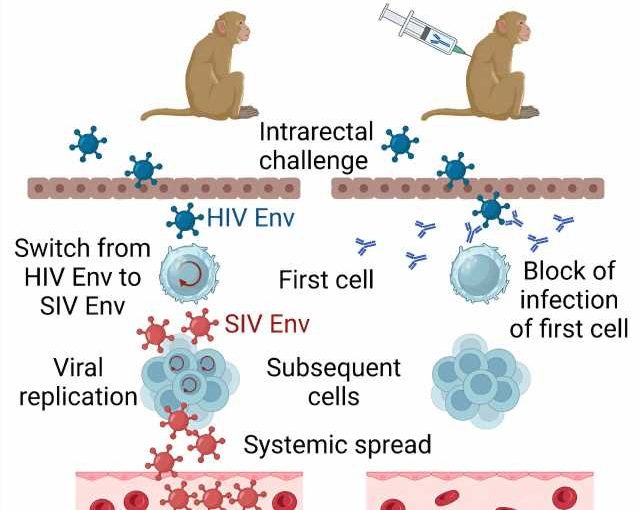
A team of researchers investigating the transmission of HIV have discovered that HIV antibodies provide sterilizing immunity by inhibiting the infection of the first cell. The research is published in the journal Cell Reports Medicine.
“HIV is a virus that is transmitted via bodily fluids,” explains Prof. Dr. Klaus Überla, head of the Institute of Clinical and Molecular Virology at FAU. “Most of the time, it passes through the mucus membranes of the genital tract or the rectum and penetrates individual cells of the immune system located in the mucus membranes with the aid of its envelope protein. From here, the virus spreads to the entire organism and weakens the immune system.”
About 39 million people infected with HIV worldwide
The virus has spread rapidly since HIV infections first became known in 1981. According to the Joint United Nations Program on HIV/AIDS, about 39 million people worldwide were infected with the virus as of 2022. There is still no cure and a vaccine has not yet been developed, but treatments are continuously improving.
“For over 20 years, we have known about antibodies that protect the cells from an infection with HIV. They can make different variants of the HI virus harmless, which means they have a broad neutralizing effect,” explains virologist Überla. “We were not aware how exactly this process works, and at which point the antibodies block the spread of the virus in the entire organism until now.”
HIV antibodies suppress infection in the first cells
The current research project now provides the answers. In conjunction with his team at the Institute of Clinical and Molecular Virology at Universitätsklinikum Erlangen and Dr. Christiane Stahl-Hennig from the German Primate Center in Göttingen, Überla has now been able to demonstrate that HIV antibodies inhibit the infection of the very first cells and that the concentration of antibodies in the mucous membranes are high enough for this to occur.
The researchers developed something known as challenge viruses based on simian immunodeficiency virus (SIV). “These viruses only use the HIV envelope protein to penetrate the very first cell. They subsequently switch and then only use the envelope protein of the simian immunodeficiency virus,” explains Überla. In studies based on animal experimentation, these challenge viruses were exposed to selected HIV antibodies.
These were selected in such a way that they only bind to the envelope protein of HIV, but not to the envelope protein of the simian immunodeficiency virus. “The HIV antibodies prevented infections with the virus via the mucous membrane of the rectum in the animal experiments,” reports Überla. “A sufficient concentration of antibodies were present in the mucous membrane and they blocked the infection in the very first cell in the mucous membrane.”
This sterilizing immunity—complete protection from an infection—is especially important for HIV. “It ensures that infected cells initially do not form viral proteins, even if they carry the genome for the virus,” explains Überla. “Years later, when antibody levels have dropped, these latent infected cells could reactivate the virus and still cause an infection.”
The antibodies used in the study are still undergoing clinical development, but after their approval, they could provide a promising approach to protecting people against an infection with HIV.
More information:
Viktoria Stab et al, HIV-1 neutralizing antibodies provide sterilizing immunity by blocking infection of the first cells, Cell Reports Medicine (2023). DOI: 10.1016/j.xcrm.2023.101201
Journal information:
Cell Reports Medicine
Source: Read Full Article
